Local
BOWSER TOPPLES GRAY
Graham loses; prospect of no gay representation on Council
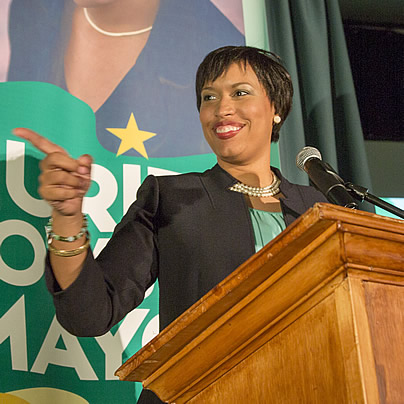
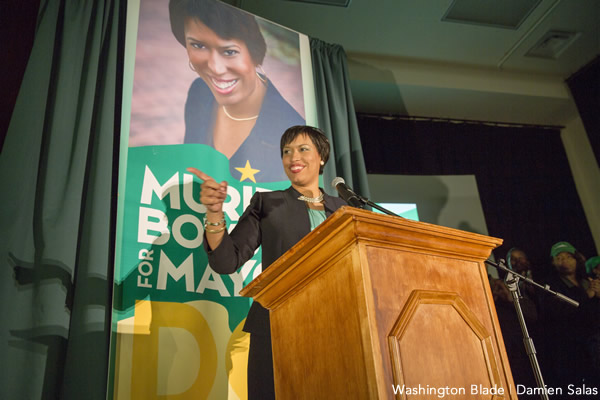
Council member Muriel Bowser defeated Mayor Vince Gray, setting up a contest with gay Council member David Catania in November. (Washington Blade photo by Damien Salas)
D.C. Council member Muriel Bowser (D-Ward 4) won 13 out of 16 precincts believed to have high concentrations of LGBT residents in her victory over Mayor Vincent Gray and six other candidates in the city’s Democratic primary on Tuesday.
In final but unofficial returns released by the Board of Elections and Ethics, Bowser had 44 percent of the vote compared to 32 percent for Gray in one of the city’s lowest turnout elections.
Bowser’s decisive win created deep disappointment among the large number of LGBT activists supporting Gray, many of whom consider him the nation’s most LGBT supportive mayor. His initiatives on transgender equality earned him strong and loyal support from the transgender community.
Although Bowser had a strong showing in voter precincts with high concentrations of LGBT residents, some activists backing Gray said they would take a careful look at gay Council member David Catania (I-At-Large), who will be running against Bowser as an independent candidate in the November general election.
“I am still proud of our mayor, Vince Gray,” said gay Democratic activist Lane Hudson, who co-founded Gray Pride, an LGBT group that campaigned for Gray.
“I will be listening very carefully to what Muriel Bowser says and does to bring our party together and also curious of the tone and approach that David Catania brings to this race,” Hudson told the Blade.
Transgender activist Jeri Hughes, along with Hudson, were among the many LGBT supporters that attended Gray’s election night gathering at the Hyatt Regency Hotel on Capitol Hill.
Like many Gray supporters, Hughes blamed Gray’s defeat on the decision by U.S. Attorney Ronald Machen to publicly disclose two weeks before the election that businessman Jeffrey Thompson implicated Gray in a scheme to raise more than $500,000 in illegal funds for Gray’s 2010 election campaign. Gray has long denied having any knowledge of the scheme, which the U.S. Attorney’s office has been investigating for four years.
“My thinking is that Ron Machen should be forced out of D.C.,” Hughes said following Gray’s concession speech. “His innuendo affected the outcome of this election, and the District of Columbia is going to have to pay for it,” she said.
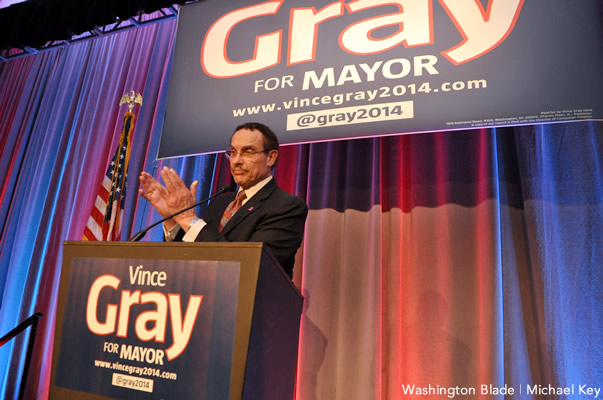
Mayor Vincent Gray lost his bid for re-election, weeks after the U.S. Attorney implicated him in a scheme to raise illegal funds for his last race. (Washington Blade photo by Michael Key)
“Vincent Gray did an excellent job as the mayor,” Hughes said. “And it’s a sad thing that innuendo can influence an election to where someone who has done an excellent job can lose in the last stages of his campaign.”
In what political observers are calling one of the biggest upsets in this year’s City Council elections, gay four-term Council member Jim Graham (D-Ward 1) lost his re-election bid to political newcomer Brianne Nadeau, a civic activist and vice president of a local public relations firm.
Final but unofficial returns reported by the Board of Elections show Nadeau received 5,755 votes, or 58.7 percent, compared to Graham, who received 4,003 votes, or 40.8 percent. Absentee and provisional ballots had yet to be counted.
Nadeau expressed strong support for LGBT rights while criticizing Graham for an ethics charge involving a Metro development contract that led to a decision by his Council colleagues to vote 11 to 2 to officially reprimand him last year.
Saying Graham’s ethics charge followed the arrest and prosecution of two other D.C. Council members on corruption-related charges, Nadeau called on voters, including LGBT voters, to elect her to send a message that political corruption is unacceptable.
Graham’s long record as a champion for LGBT rights and his work in fighting AIDS as the former executive director of the Whitman-Walker Clinic made him highly popular in the LGBT community. And his reputation as one of the Council’s strongest providers of constituent services made him highly popular among the ward’s highly diverse population groups, including Latino and African immigrants.
Most political observers in the ward believe the ethics issue was the key factor in Graham’s loss of support from many of his constituents, including LGBT residents.
Nadeau beat Graham decisively in four of six Ward 1 precincts believed to have large numbers of LGBT residents in Adams Morgan, Columbia Heights and the U Street, N.W. corridor. Graham won just one of the six precincts — Precinct 36 in Columbia Heights — by a margin of 52 percent to 48 percent.
He lost Precinct 137 in the U Street corridor by just one vote, with Nadeau receiving 125 votes to Graham’s 124 votes. Nadeau won the others by margins of greater than 10 percent.
“We did our best to represent the great diversity of this ward, bringing together people of all backgrounds in a common purpose who deserve good representation here in Ward 1,” Graham said at his election night gathering in a restaurant in Mount Pleasant.
“Let’s give all of the people who worked so hard a round of applause because we have solid support from African Americans, solid support from Latinos, solid support from the Ethiopian community, solid support from the Vietnamese and pretty solid support from people who look like me,” he said.
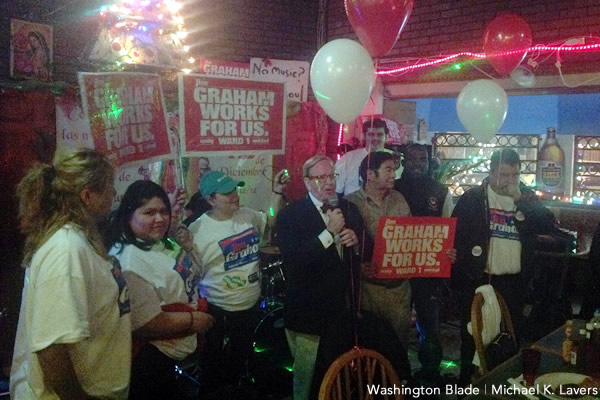
Gay Council member Jim Graham was defeated on Tuesday, ending a 16-year run on the Council. (Washington Blade photo by Michael K. Lavers)
In her victory speech at another restaurant at 11th and U streets, N.W., Nadeau thanked Graham for what she said were his years of service to Ward 1. But she also reiterated her campaign call for addressing ethics in government.
“Today voters embraced ethical leadership focused on making Ward 1 more affordable and improving our neighborhood schools,” she said. “Together we built a strong grassroots movement for progressive change, one that resonated far and wide with voters.”
With Nadeau and Bowser perceived as being strongly committed to LGBT rights, even though their records could not stand up to the accomplishments of Graham and Gray on those issues, many LGBT voters chose to base their vote on non-LGBT issues, according to activists following the city’s April 1 primary.
“All of the candidates are great on our issues and we are really fortunate to have an embarrassment of riches among the candidates,” said gay businessman Everett Hamilton, who is among Bowser’s leading LGBT supporters.
The six other Democratic mayoral candidates, all of whom expressed strong support for LGBT equality, finished far behind Bowser and Gray.
Council member Tommy Wells (D-Ward 6) came in third place with 13 percent of the vote. Council member Jack Evans (D-Ward 2) came in fourth with 4 percent. Busboys and Poets restaurant owner and progressive activist Andy Shallal finished fifth with 3 percent followed by Council member Vincent Orange (D-At-Large) who received 2 percent. Former State Department official Reta Lewis and businessman and singer Carlos Allen received less than 1 percent.
Similar to other D.C. residents, most LGBT voters are registered Democrats. But at least some longtime LGBT Democratic activists have said they would seriously consider backing Catania in the general election in November.
Gay Democratic activist Paul Kuntzler, a founding member of the Gertrude Stein Democratic Club, the city’s largest LGBT political group, supported Gray in the primary. In a letter he sent to Catania’s office on Wednesday, Kuntzler said he’s supporting Catania over Bowser in November.
“I believe David will make a great mayor,” he said. “I also believe he will win in November. I have voted for him every time he has been on the ballot.”
A poll released by the Washington Post in late March, however, showed that Bowser was favored by voters participating in the poll by a margin of 56 percent to 23 percent. Catania’s campaign manager, Ben Young, said the poll was conducted just two weeks after Catania declared his candidacy for mayor and after Bowser had been campaigning for more than a year.
Young, along with other Catania supporters, said Catania’s support would rise in the coming months as he steps up his campaign.
In other races, D.C. Council Chair Phil Mendelson (D-At-Large), won his primary contest by beating Democratic challenger Calvin Gurley by a margin of 81 percent to 18 percent. A series of attack ads lodged against Mendelson by the Labor Committee of the Fraternal Order of Police, which acts as the local D.C. police union, accusing Mendelson of failing to take adequate measures to fight anti-LGBT hate crimes appears to have had no impact on the election.
Incumbent Council member Anita Bonds (D-At-Large), a longtime supporter of LGBT rights, won in a six-candidate race by capturing 53 percent of the vote. Challenger Nate Bennett-Fleming, who campaign aggressively for the LGBT vote, came in second with 22 percent. Challenger John Settles received 14 percent, with Pedro Rubio and Kevin Valentine receiving 7 percent and 3 percent.
Council member Kenyan McDuffie (D-Ward 5) defeated two Democratic challengers in his primary contest by capturing 79 percent of the vote. In Ward 6, where the Council seat is being vacated by Tommy Wells, who ran for mayor, Wells’ former chief of staff, Charles Allen beat former U.S. Senate staffer Darrel Thompson by a margin of 58 percent to 42 percent.
In a hotly contested race for the city’s shadow U.S. Senate seat, incumbent Paul Strauss defeated challenger Pete Ross by a margin of 60 percent to 38 percent.
D.C. congressional Del. Eleanor Holmes Norton (D) and Council member Mary Cheh (D-Ward 3) ran unopposed in their respective races.
Maryland
Maryland’s oldest rural gay bar — and one of the last — is a log cabin in the woods
The Lodge is a Boonsboro watering hole resembling a log cabin
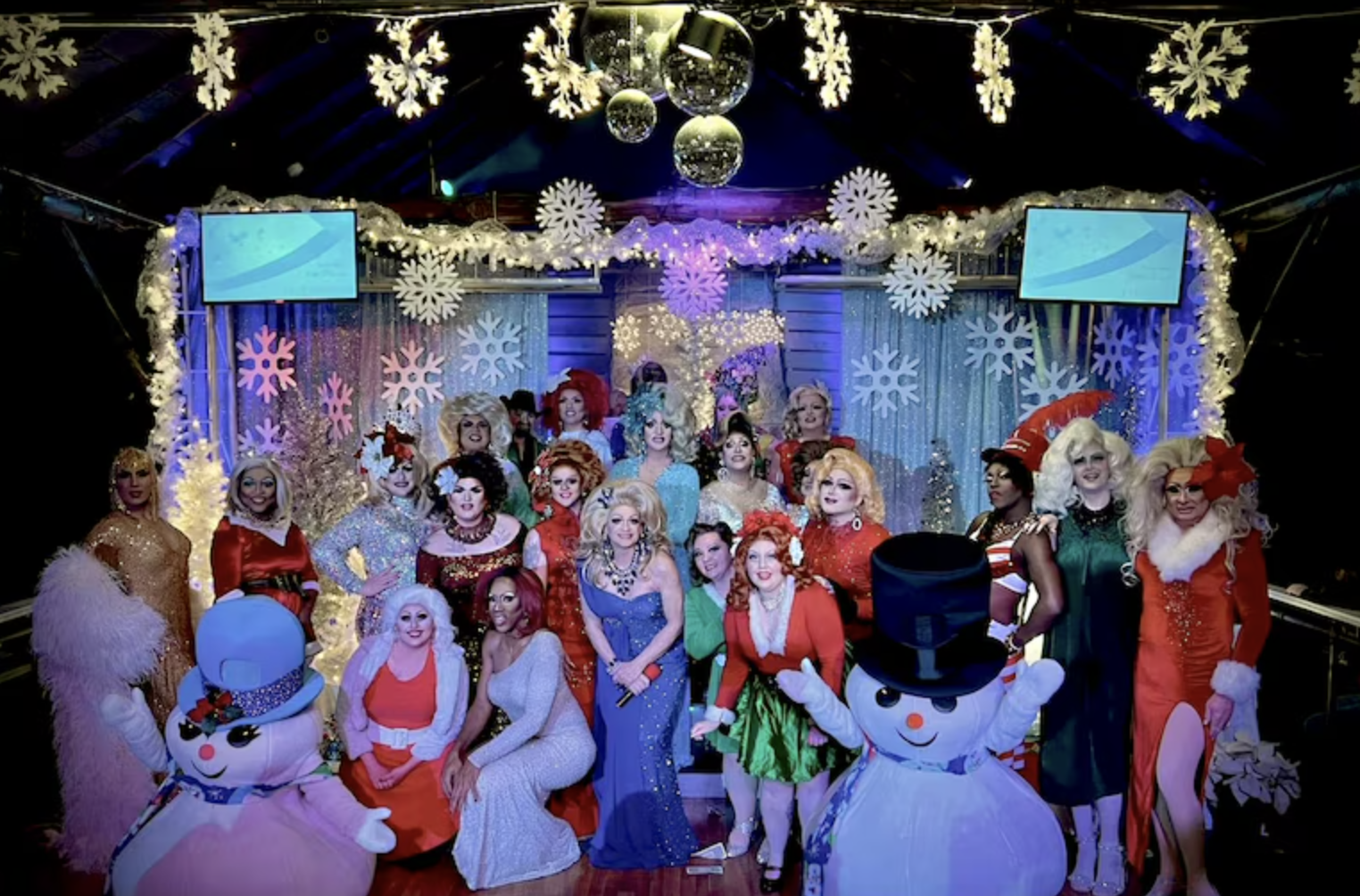
By SAPNA BANSIL | In the woods of a conservative Western Maryland town of fewer than 4,000 people is an unlikely landmark of state LGBTQ history.
The Lodge, a Boonsboro watering hole that resembles a log cabin, is Maryland’s oldest rural gay bar — one of a few remaining in the country, according to historians.
For about four decades, the Washington County venue has offered safety, escape and community to queer people far from large, liberal cities. Starting Friday night, The Lodge will close out Pride month with one of its biggest parties of the year: a weekend of dancing, drinking and drag in celebration of Frederick Pride, held about 20 miles away in the area’s largest city.
The rest of this article the Baltimore Banner published on June 27 can be read on its website.
Virginia
Va. court allows conversion therapy despite law banning it
Judge in June 30 ruling cited religious freedom.

In 2020, the state of Virginia had banned the practice of conversion therapy, but on Monday, a county judge ruled the ban violates the Virginia Constitution and Religious Freedom Restoration Act, allowing the therapy to start once more.
The conversion therapy ban, which can be seen in Va. Code § 54.1-2409.5 and 18VAC115-20-130.14, was overturned on June 30 as a result of two Christian counselors who argued that their — and all Virginia parents’ — constitutional right to freedom of religion had been encroached upon when the state legislature passed the ban.
A Henrico County Circuit Court judge sided with John and Janet Raymond, two Christian counselors represented by the Founding Freedoms Law Center, a conservative organization founded in 2020 following Virginia’s conversion therapy ban. Virginia’s Office of the Attorney General entered a consent decree with FFLC, saying state officials will not discipline counselors who engage in talk conversion therapy.
Conversion therapy, as the legislation described it, is considered to be “any practice or treatment that seeks to change an individual’s sexual orientation or gender identity, including efforts to change behaviors or gender expressions or to eliminate or reduce sexual or romantic attractions or feelings toward individuals of the same gender.” The ban’s reversal will now allow parents to subject their children to these practices to make them align better with their religion.
This decision comes despite advice and concern from many medical and pediatric organizations — including the American Psychiatric Association, American Psychological Association, American Association for Marriage and Family Therapy, and the American Counseling Association, to name a few — all of which denounce conversion therapy as dangerous and harmful to those subjected to it.
The American Medical Association, the largest and only national association that convenes more than 190 state and specialty medical societies, says that “these techniques are the assumption that any non-heterosexual, non-cisgender identities are mental disorders, and that sexual orientation and gender identity can and should be changed. This assumption is not based on medical and scientific evidence,” with attached data indicating people subjected to conversion therapy are more likely to develop “significant long-term harm” as a result of the therapy.
The AMA goes as far as to say that they outright “oppose the use of reparative or conversion therapy for sexual orientation or gender identity.”
FFLC has a clear goal of promoting — if not requiring — conservative ideology under the guise of religious freedom in the Virginia General Assembly. On their website, the FFLC argues that some progressive policies passed by the Assembly, like that of freedom from conversion therapy, are a violation of some Virginians’ “God-given foundational freedoms.”
The FFLC has argued that when conservative notions are not abided by in state law — especially when it involves “God’s design for male and female, the nuclear family, and parental rights” — that the law violates Virginians’ religious freedom.
A statement on the FFLC’s website calls gender dysphoria among children a “contagion” and upholds “faith-based insights” from counselors as equal — in the eyes of the law — to those who use medical-based insights. This, once again, is despite overwhelming medical evidence that indicates conversion therapy is harmful.
One study showed that 77 percent of those who received “sexual orientation change efforts,” or conversion therapy, experienced “significant harm.” This harm includes depression, anxiety, lowered self-esteem, and internalized homophobia. In addition, the study found that young LGBTQ adults with high levels of parental or caregiver rejection are “8.4 times more likely to report having attempted suicide,” with another study finding that “nearly 30 percent of individuals who underwent SOCE reported suicidal attempts.”
Virginia Senate Majority Leader Scott Surovell, a Democrat representing Fairfax, said that the overturning of the ban on religious merit disregards the entire concept of having professionally licensed counselors.
“I have no problem if somebody wants to go look at religious counseling from their priest or their minister, their rabbi, their imam — that’s perfectly fine,” Surovell told the Virginia Mercury. “When somebody goes to get therapy from somebody licensed by the commonwealth of Virginia, there’s a different set of rules applied. You can’t just say whatever you want because you have a license. That’s why we have professional standards, that’s why we have statutes.”
District of Columbia
GenOUT Chorus offers solace, strength to LGBTQ teens
Summer camp held from June 23-27

As Pride month draws to a close and Washington begins to take down its rainbow flags and WorldPride decorations, it can be easy to confine the ideas of LGBTQ liberation to June. One historic organization in Washington has been speaking out — or singing out if you will — to ensure that LGBTQ youth are allowed to explore and be themselves every month of the year.
The Gay Men’s Chorus of Washington is one of the oldest and largest LGBTQ choruses in the world. With more than 300 members and more than 40 years in the D.C. LGBTQ community, to say it is an institution would be an understatement.
Beginning in 1981, following an inspiring performance by the San Francisco Gay Men’s Chorus at the Kennedy Center, a group of 18 gay men — led by a “straight” woman and friend of Washington’s gay community, Marsha Pearson — created the GMCW. Since its establishment the organization has only grown in number and relevance within the city. From hosting multiple concerts a year, international equality trips, and creating a dedicated space to “inspire equality and inclusion with musical performances and education,” the GMCW is one of the cornerstone organizations in the Washington LGBTQ community.
One of the most remarkable parts of the GMCW is its youth outreach program and choir: GenOUT. The outreach ensemble specializes in providing a space for Washington’s LGBTQ and allied youth, ages 13-18, to find their voice through song and connect that voice to community. The GenOUT program has been around since 2001, and since 2015 has provided a platform for their voices to be heard — literally — making it the first LGBTQ youth chorus in the Washington area.
The Washington Blade sat down with GenOUT Director C. Paul Heins and member Ailsa Ostovitz to discuss why GenOUT, and more specifically the GenOUT summer camp, which was held from June 23-27, has become an essential space for LGBTQ youth in the D.C. area to find their voice amid less-than-supportive administration and rising anti-LGBTQ rhetoric in the nation.
“This is my 11th season with GenOUT, and also the 11th season with Gay Men’s Chorus of Washington,” Heins said when explaining how he ended up in the director role for the self-selected, no audition required youth outreach ensemble. “I was hired in August of 2014 to start GenOUT. I spent that first fall researching other choruses, figuring out the infrastructure, promoting the chorus, and building relationships with schools, organizations, and faith communities. And then we started in January of 2015 with nine brave singers and since then, we’ve had 150+ singers from 80 or more schools in the DMV participate.”
Ailsa Ostovitz, on the other hand, being in high school had not had as much experience with choirs — yet her commitment and unwavering passion for the work she — and the other performers within GenOUT provide to each other was unmistakable.
“I’ve been a part of the course since April of 2022, and that was like seventh grade— which is wild to think about,” Ostovitz said when reflecting on how long she had been a part of GenOUT. She explained how she had begun to develop a drive for filling leadership roles within GenOUT after gaining valuable experiences and education from the organization.
“This is my first year in leadership,” she added. “The rest of the years, I kind of hung back. I really wanted to — especially last season — kind of put myself in the position of a peer and think ‘What would I want from people that are supposed to represent me to the adults? What would I want out of that?’”
And with those questions in mind, Ostovitz explained she buckled down and worked hard to get to where she is now as a member of the leadership team within the GenOUT choir.
“I spent a lot of time working with my section leader, and, looking up at him and being like, ‘What are you doing now that I can do in the future?’ And so this year, I ran for leadership,” Ostovitz said. “I got section leader, and that was cool. I’ve just spent a lot of time — most of my time in this course — learning leadership skills to kind of help me in all sorts of things in life, because I like to take control of things, and I like doing stuff.”
These leadership skills are just a handful of the things that students like Ostovitz learn while participating in the program. This year’s theme was “Make Them Hear Us!: Empowering LGBTQ+ and Allied Youth Through Music, Media, and Community,” and provided multiple opportunities for GenOUT’s members to engage with new concepts, ideas, and experiences.
From field trips to mentoring opportunities to an end-of-camp performance, it becomes clear when speaking to those familiar with the GenOUT experience: it is not your traditional summer day camp.
“The title of the camp references the anthem that GMCW has sung for many years,” Heins said. “‘Make Them Hear You’ from the musical ‘Ragtime’ encourages us to share important stories — stories that honor the fights that we’ve been fighting, the rights that we have won, affirmations that we seek for every human being, and the focus on media — specifically developing young people’s understandings of the kinds of media that they can access and use to share their voice.”
The camp offers singing and dancing lessons, creative writing exercises, LGBTQ+ history lessons, and open discussions about identity — providing an outlet for students to figure out who they want to be and find their voice.
“What this camp does, I believe, is it helps foster young people’s voices and not only encourages them to speak, but to give them the skills to speak in a way that will be heard meaningfully,” Heins added. “I have noted that youth in queer choruses like GenOUT have said that singing in a chorus allows young people to express themselves more honestly and with greater passion than other forms of expression. They’ve also said that singing with others that understand you on a very deep, profound level, makes the expression much easier and more beautiful. I think that experience is what really makes this a special opportunity for young, LGBTQ and allied people.”
Ostovitz echoed Heins’s sentiment, emphasizing that the space GenOUT provides allows her to feel empowered in ways more than by creating leadership skills that will help her later in life. GenOUT has allowed for her to see the humanity and similarities LGBTQ youth all face in a straight world.
“Joining the chorus and being in this camp, it really gives people a chance to see that every person is going through the same experience you are, on a level of finding your own identity and being confident in that,” Ostovitz said. “It really, really serves a purpose by showing there are still queer people. They’re not fizzling out — young people are queer. We want to use our voices to express what we feel and how things are affecting us, and I think that using music to do that is probably one of the most powerful ways to do that.”
In addition to allowing for internal growth and honing their singing abilities, both Ostovitz and Heins pointed out the other valuable skills students learn while in the GenOUT program. Ostovitz explicitly highlighted the mentorship program GenOUT has with GMCW, and how it has helped students like her figure out their future.
“Because we are so connected with GMCW, we run a mentorship program where, if you want to explore career, identity, whatever, we can connect you with somebody from GMCW,” Ostovitz said. “You get to spend a whole semester with a person working on your voice or your career or your what you want to do in higher education. It’s not only for things related to your queer identity, but it’s also just for life. It’s really cool.”

This year’s theme, centering around media and the many ways people can share their voice, was highlighted through the camp’s field trips to two legacy media organizations — WAMU and NBC Washington — and a discussion with staff from the Washington Blade, including Publisher Lynne Brown and International News Editor Michael K. Lavers.
“GenOUT provides a chance to get to know people from all around this area, but it also connects you to older folks, It connects you to people from the past, as well as we learn about LGBTQ history,” Heins said. “I think a camp specific thing is we want young people to understand how they can share their stories beyond just talking to their friends. There are these forms of media that are out there to share your stories, to have your voices heard, and to have a sense that these media are there for everyone. It’s not just a thing for people aged 21 and over. That was something that Lynne and Michael from the Blade were sharing with; that anyone can write in a letter to the editor. It doesn’t mean it’s going to be published, but that anyone has that opportunity. And I think that’s a great way for them to say the Blade is open to you to share your voice.”
The concept that there are people who want to, or may need to hear queer voices represented is one that is not lost on Ostovitz.
“There is something Thea says that has kind of integrated into our chorus — that someone out there needed to hear you, needed to hear your voice, needed to hear your story,” Ostovitz said. “That’s something that I kind of live by in this chorus, where I’m like, ‘I believe that there is someone out there that needed to hear this song for whatever reason, whatever it did for them. And I’m hoping to learn how much more can this chorus do for not just our little community, but how much more can it do around the world or the country — especially now.”
Living in the political center of the U.S., Ostovitz explained, has impacted how she approaches her identity, her education, and the urgency of using her voice — both as a student and as a young queer person navigating an increasingly hostile national climate.
“Being so close to the political center of the country and also a student at the same time has not been the easiest thing in the world as of late,” she said. “You’re thinking a lot about ‘Oh, I wonder if this program in my school will still exist next year,’ because a lot of the funding for physics and science programs in general has been cut. So I’m fortunate enough that Maryland has been pretty good about going against this administration. And so being in this chorus gives me a second to step back from my academics and just go somewhere for the two hours of rehearsal.”
For Ostovitz, just having those two short hours a week to focus on music — without thinking about the political climate that paints her and her choir peers as nefarious for being LGBTQ — provides solace.
“Everybody else is going through the same thing as I am, but we’re all also working towards the same goal, which is acceptance and uplifting of everybody and everyone — no matter who they are,” she said. “It kind of settles you down and grounds you. And then you just make music with people, and it’s really like a stress reducer for me.”
“Is it too trite to say that that would make people feel less alone, knowing that it’s not just a DMV thing, but that there are queer people all over?” Heins asked Ostovitz.
“No, it’s not — for sure,” Ostovitz responded. “It was a bit eye-opening.”
“A lot of us are fortunate enough to have families that support us enough to trust us and help us be passionate and mean what we do with the work that we do in this chorus — because it is optional,” Ostovitz added. “It is optional to have the courage that we have to practice and commit as much as we do, and the fact that we have a whole organization backing us on that is pretty cool.”
“We often say that we sing for those who can’t sing in a chorus like ours,” Heins said. “We sing for people who don’t have the freedom or the option to live their authentic lives. I think that’s very powerful.”
“It’s a very unique experience to be surrounded by so many people that get it,” Ostovitz said. “It’s a very joyful experience when we perform our big shows at the Lincoln Theater, being part of that production is also a very unique experience. So I think everything about this chorus is very joyfully unique.”
“I feel very proud, and I feel very inspired,” Heins said. “I feel inspired by the young voices. I feel a sense of inspiration in my own music-making, when I am able to take a piece from its very beginning all the way to the stage in a polished form. And I feel that sense of pride in knowing that I’ve helped this group of young people develop their confidence to do really amazing things.”
“GenOUT sang 22 times last year, which for any chorus is a big deal, but for a youth chorus coming from thither and yon, it is really a big deal,” Heins added. “I’m just really inspired and proud, and know that when I am in a nursing home somewhere and these folks are still out working and I know the country will be in good hands.”



















